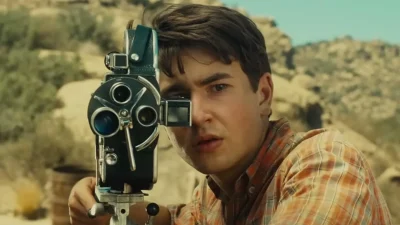

Spielberg is a master storyteller, so, as he and Tony Kushner developed and wrote the screenplay for the re-imagined re-telling of Spielberg’s boyhood, he naturally had to find a compelling  story to tell. He chose to focus mainly on his parents, played by Michelle Williams and Paul Dano, and their topsy-turvy relationship, which was mostly defined by his mother’s idiosyncrasies and eccentricities (which would today be assessed as mental illness) and their family’s nomadic existence, as the family moved several times in a short time, due to his father’s multiple promotions within the rapidly growing computer science industry.
story to tell. He chose to focus mainly on his parents, played by Michelle Williams and Paul Dano, and their topsy-turvy relationship, which was mostly defined by his mother’s idiosyncrasies and eccentricities (which would today be assessed as mental illness) and their family’s nomadic existence, as the family moved several times in a short time, due to his father’s multiple promotions within the rapidly growing computer science industry.
One way the young Spielberg, whose character’s name is changed from Steven to Sammy (and the family name Spielberg to Fabelman, presumably to account for dramatic license in the storytelling) and is played by Gabriel LaBelle, copes with the drama within his family is to escape to moviemaking. Sammy falls in love with movies from the first time he sees the big screen, and his “hobby,” as his father commonly refers to it, is the dominant force in his youth, as he enlists everyone, from family to friends, to be parts of his homemade films, which he would edit in his bedroom. It’s clear that Spielberg thinks he was born to make movies, and his self-portrayal of himself goes a long way to prove that analysis. It’s great fun to see the young Sammy develop his craft and get all his friends to go along with his passion, I wish that was the movie I had seen.
Instead, The Fabelmans spends most of its time analyzing the marriage of Sammy’s parents, kooky and free-spirited Mitzi and practical, unemotional Burt, who have to navigate complicated issues in their marriage, which trickle down to negatively affect the children, especially Sammy, the oldest and the spiritual soulmate of his mother, whose artistic passions have been passed down to her only son. Spielberg’s obvious affection for his mother and her influence on his life and career path cause the director to invest way too much of the film to what amounts to not much more than a therapy session.
There is also a weird tangent that involves school bullies that feels unnecessary, but what saves The Fabelmans from being an arduous exercise in sentimentality is the quarter of the film that is spent with Sammy behind a camera, pursuing his passion. That’s what we’re here for, after all, and it comes across really well, especially the final scene of the film, which contains a cameo that makes the previous two and a half hours worthwhile—and makes you long for what else could have been if Spielberg had just chosen to tell more of that story.
The performances also help to save The Fabelmans from being a total disappointment. Williams delivers, as she always, does, and Dano is warm and wonderful (words not usually associated with him on screen). There are supporting performances by Seth Rogen and Judd Hirsch which are memorable, even though Hirsch’s one scene feels way too Oscar-bait-y. But the real star here is unknown young actor Gabriel LaBelle, who keeps each scene from dragging through his charm and absolutely irresistible warmth.
The score by John Williams, which he apparently came out of retirement to do, is noteworthy because of how different it feels from every other of the twenty-eight feature films he’s done with Spielberg. There’s no big, symphonic sound here, instead, Williams told Spielberg that the score to The Fabelmans is a gift to the memory of his parents, who he got to know before they both passed. For Spielberg’s most personal film, Williams gives him the most personal and intimate composition, comprised mostly of piano music and classical arrangements.
All the other production elements are typical Spielberg, including reliably beautiful cinematography from longtime collaborator Janusz Kaminski (West Side Story) and elegant production design from Rick Carter (Lincoln). It’s just too bad that the overall effect of The Fabelmans is disappointing, as it revels too much in sentiment, leaving what we really wanted to see on the editing room floor.
